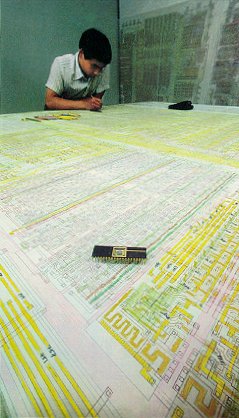| Playing with intelligent machines |
|
A strange thing is going on here. These people are being changed by the computers they work with. They love the machines, bugs and all. It's not just the games, nor the engineering personality's desire for logic and order that makes these computers so stimulating: it's their size. They've got small enough to become individuals. These programmers are no longer working with systems. They are working with friends. They are on such intimate terms that they swear at them, hit them, even laugh with them. What is strangest, though, is that they seem to bear no resemblance to those human cyborgs science-fiction writers warned we would become once the computers got hold of us. Instead, these people seem to be having a hell of a time.
Trying to explain, Dona talks about her microprocessor with a romantic passion that men don't always inspire. "In the Valley, almost everybody has something to do with computers, and some people think I'm just frittering my life away here," she says without a blush. "A lot of them work on IBM 370s and that kind of thing, and they can't fathom what it is to have the whole little thing to yourself!"
"The computer is a pal that doesn't get mad"
What's really going on here? Before coming to Atari I had asked Isaac Asimov, a pioneer in science fiction, why he thought these games were so attractive. "Kids like the computer because it plays back," he said. "You can play with it, but it is completely under your control, it's a pal, a friend, but it doesn't get mad, it doesn't say 1 won't play,' and it doesn't break the rules. What kid wouldn't want that?" That sense of being in control seems to be something Atari programmers enjoy as much as the players. Indeed, there are cognitive psychologists like James McConnell at the University of Michigan who think our most basic drive is an urge to get the environment under control.
McConnell describes behavior in terms of feedback terminology: "The nice thing about using computers is that you can establish control over your inputs, which allows you then to control your outputs." In other words, if you control the challenge or reward, you can improve your performance. McConnell's language is remarkably similar to what one of Atari's electronics engineers said to me, as he was explaining how a game works: "Essentially we have a microprocessor and input-output devices. All these games are, is process control. You take some kinds of inputs


